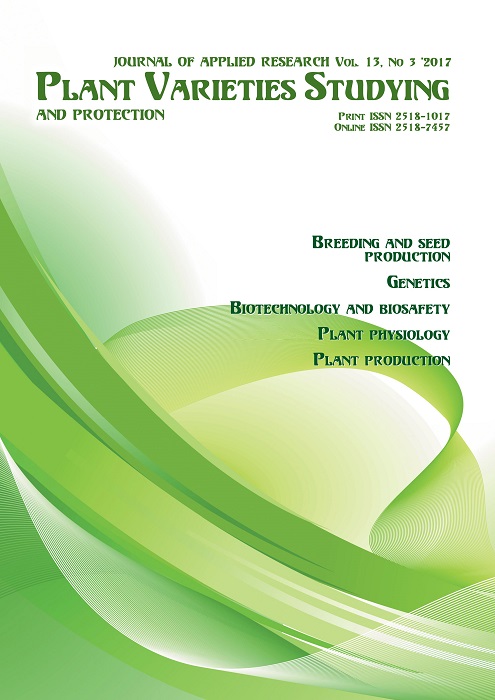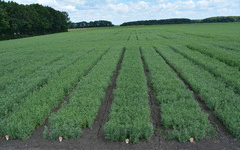Hazelnut breeding in the National Dendrological Park “Sofiyivka” of the NAS of Ukraine
DOI:
https://doi.org/10.21498/2518-1017.13.3.2017.110706Keywords:
breeding, cultivar, natural area of genus, hybridization programme, nut, speciesAbstract
Purpose. To evaluate hazelnut cultivars, species and hybrids from the genetic collection of Corylus spp. in the National Dendrological Park “Sofiyivka” of the NAS of Ukraine for the complex of economic characters. An attempt has been made to analyze the information on Corylus spp. identity, taxonomy and description, dissemination and ecological requirements of the species, possibilities to use the genetic potential for developing new cultivars.
Methods. The value of the Corylus spp. collection representatives was investigated using conventional testing procedures. For summarizing information concerning phylogenetic reconstruction of the Corylus L. genus and hazelnut, a number of scientific publications to be proposed for discussion was analyzed. The oil content in hazelnut kernels and the fatty acid composition was determined using official methods.
Results. The best samples of hazelnut genetic collection were included into the broad hybridization programme, and C. chinensis Franch. representatives as well. A number of hybrid seedlings was obtained including new hazelnut cultivars ‘Sofiyivsky 1’, ‘Sofiyivsky 2’ and ‘Sofiyivsky 15’ which were characterized by spherical or almost spherical fruits, high winter hardiness and drought resistance, as well as the absence of rhythmicity in fruiting.
Conclusions. The collection of varieties, forms, cultivars and species of the Corylus L. genus created during the last years can be the base for hazelnut breeding in Ukraine.
Downloads
References
Kosenko, I. S., Opalko, A. I., Balabak, O. A., & Shulga, S. M. (2016). The use of Corylus spp. genetic collection of the National Dendrological Park “Sofiyivka” for hazelnuts Corylus domestica Kos. et Opal. breeding. Avtokhtonni ta introdukovani roslyny [Autochthonous and invasive plants], 12, 121–136. [in Ukrainian]
Hazelnuts, with shell. (2014). In FAOSTAT Domains Production/Crops: Average. URL: http://faostat3.fao.org/browse/Q/QC/E (accessed 25.05.2017).
Maloshtan, L. M., Kalenichenko, G. S., & Dorovskyy, O. V. (2015). The study of the action of the thick extract from the leaves of Corylus avellana on the vascular tissue permeability. Klin. farm. [Clinical Pharmacy], 19(4), 26–29. doi: 10.24959/cphj.15.1362
Esposito, T., Sansone, F., Franceschelli, S., Del Gaudio, P., Picerno, P., Aquino, R. P., & Mencherini, T. (2017). Hazelnut (Corylus avellana L.) shells extract: phenolic composition, antioxidant effect and cytotoxic activity on human cancer cell lines. Int. J. Mol. Sci., 18(2), 392. doi: 10.3390/ijms18020392
Lemmon, M. A. (2008). Membrane recognition by phospholipid-binding domains. Nat Rev Mol Cell Biol., 9(2), 99–111. 10.1038/nrm2328
Efremenko, V. I. (1999). Liposomy (poluchenie, svoystva, aspekty primeneniya v biologii i meditsine) [Liposomes (obtaining, properties, aspects of usage in biology and medicine)]. Stavropol: N.p. [in Russian]
Angelova-Romova, M., Zlatanov, M., Antova, G., Momchilova, S., Blagoeva, E., & Nikolova, M. (2013). Phospholipids content and composition of hazelnut and walnut cultivars grown in Bulgaria. Comptes rendus de l’Académie bulgare des Sciences, 66(12), 1689−1694.
Corylus. (2017). In Catalogue of Life: 29th May 2017. Naturalis Biodiversity Center. URL: http://www.catalogueoflife.org/testcol/search/all/key/Corylus/match/1 (accessed 30.05.2017)
Corylus. (2013). In The Plant List by the Royal Botanic Gardens Kew and Missouri Botanical. URL: http://www.theplantlist.org/tpl1.1/search?q=Corylus (accessed 23.08.2017).
Woodworth, R. H. (1929). Cytological studies in the Betulaceae. II. Corylus and Alnus. Botanical Gazette, 88(4), 383–399.
Fedorov, A. A. (Ed.). (1969). Khromosomnye chisla tsvetkovykh rasteniy [Chromosome numbers of flowering plants]. Leningrad: Nauka. [in Russian]
Danielsson-Santesson, B. (1951). Fortsatta Undersökningar av polyploid hassel. Sveriges Pom. Fören. Årsskrift., 52, 38–48.
Molnar, T. J., (2011) Corylus L.. In C. Kole (Ed.), Wild crop relatives: genomic and breeding resources. Forest trees. (Vol. 10, pp. 15–48). Berlin, Heidelberg: Springer. doi: 10.1007/978-3-642-21250-5_2
Thompson, M. M., Lagerstedt, H. B. & Mehlenbacher, S. A. (1996). Hazelnuts. In J. Janick & J. N. Moore (Eds.), Fruit Breeding: Vol. 3. Nuts (pp. 125–184). New York: Wiley.
Kubitzki, K. (1993). Betulaceae. In K. Kubitzki, J. G. Rohwer, & V. Bittrich (Eds.), The families and genera of vascular plants: Vol. 2. Flowering Plants. Dicotyledons: Magnoliid, Hamamelid and Caryophyllid Families (pp. 152–157). Berlin, Heidelberg: Springer Verlag.
Botta, R., Emanuel, E., Me, G., Sacerdote, S. & Vallania, R. (1986). Indagine cariologica in alcune specie del genere Corylus. Riv. Ortoflorofrutt. Ital., 70(5), 323–329.
Erdoğan, V. (1999). Genetic relationships among hazelnut (Corylus) species. Ph.D. Thesis (Horticulture). Oregon State University, Corralis, OR, USA.
Mehlenbacher, S. A., Brown, R. N., Nouhra, E. R., Gokirmak, T., Bassil, N. V., & Kubisiak, T. L. (2006). A genetic linkage map for hazelnut (Corylus avellana L.) based on RAPD and SSR markers. Genome, 49(2), 122–133.
Kasapligil, B. (1968). Chromosome studies in genus Corylus. Scientific reports of the Faculty of Science, Ege University, 59, 3–14.
Wetzel, G. (1929). Chromosomen studienbei den Fagales. Botanisches Archiv: Zeitschrift für die gesamte Botanik, 25(3/4), 257–283.
Vavilov, N. I. (1926). Tsentry proiskhozhdeniya kulturnykh rasteniy [Centers of cultivated plants origin]. Leningrad: All-Union Research Institute of Applied Botany and New Crops, GIOA. [in Russian]
Masla rastitelnye. Metod opredeleniya zhirnokislotnogo sostava: GOST 30418-96 [Vegetable oils. Method of determination of fatty acid content: State Standart 30418-96] (рр. 110–116). (2001). Moscow: Standard Publishing House. [in Russian]
Ma, Q. H., Wang, G. X., Liang, W. J., Chen, X., Liang, L. S., & Zhao, T. T. (2013). Progress on pollen-stigma compatibility in Corylus (hazelnuts): a review. J. For. Res., 24(3), 397–402. 10.1007/s11676-013-0372-7
Grodzinskiy, А. М., Balabushka, V. K., Balabushka, L. V., Kosenko, I. S., & Parkhomenko, L. I. (1989). Avtorskoe svidetelstvo № 1547733. Sposob poseva semyan drevesnykh rasteniy. [Invention certificate No. 1547733. Method of sowing of woody plant seeds]. Registered in the National registry of inventions of the USSR November 8, 1989. [in Russian]
Kosenko, I. S., Balabak, O. A., Opalko A. I., Tarasenko, H. A., & Balabak, A. V. (2015). Patent na korysnu model № 98106. Sposib rozmnozhennia funduka [UA Patent on the useful model No. 98106. Method of hazelnut propagation]. Registered in the National patent registry of Ukraine on useful models 10.04.2015. [in Ukrainian]
Downloads
Published
How to Cite
Issue
Section
License
Copyright (c) 2017 Ukrainian Institute for Plant Variety Examination

This work is licensed under a Creative Commons Attribution-ShareAlike 4.0 International License.
Starting in 2022, the copyright to the publication remains with the authors
Our journal abides by the CREATIVE COMMONS copyright rights and permissions for open access journals.
Authors, who are published in this journal, agree to the following conditions:
- The authors reserve the right to authorship of the work and pass the first publication right of this work to the journal under the terms of a Creative Commons Attribution License, which allows others to freely distribute the published research with the obligatory reference to the authors of the original work and the first publication of the work in this journal.
- The authors have the right to conclude separate supplement agreements that relate to non-exclusive work distribution in the form in which it has been published by the journal (for example, to upload the work to the online storage of the journal or publish it as part of a monograph), provided that the reference to the first publication of the work in this journal is included.

























 Ukrainian Institute for Plant Varieties Examination
Ukrainian Institute for Plant Varieties Examination  Селекційно-генетичний інститут
Селекційно-генетичний інститут Institute of Plant Physiology and Genetics of the National Academy of Sciences of Ukraine
Institute of Plant Physiology and Genetics of the National Academy of Sciences of Ukraine
 The National Academy of Agrarian Sciences of Ukraine
The National Academy of Agrarian Sciences of Ukraine